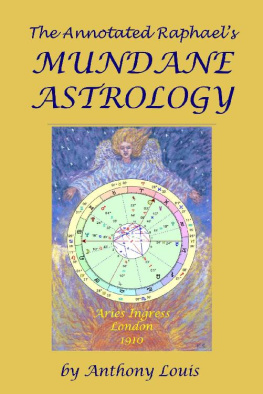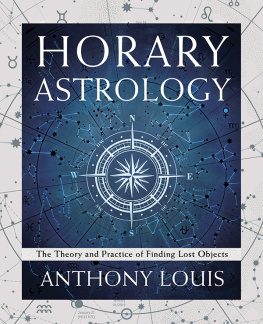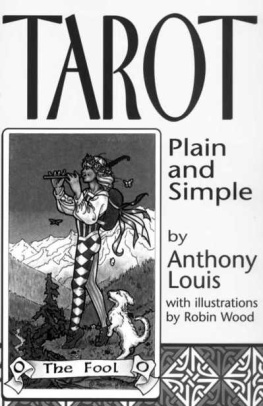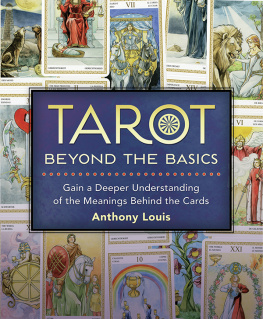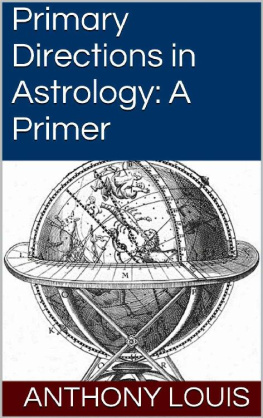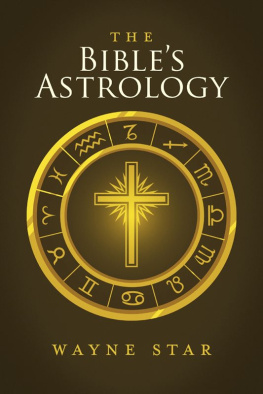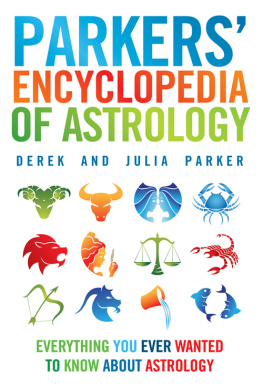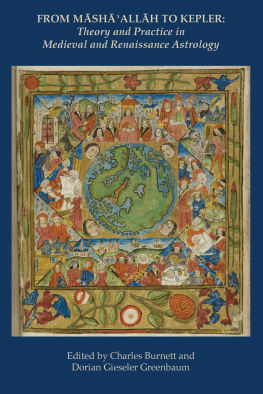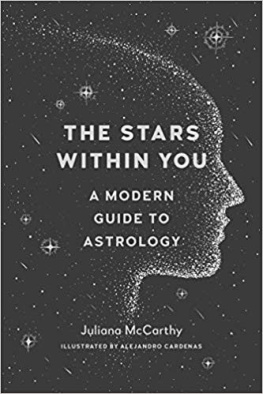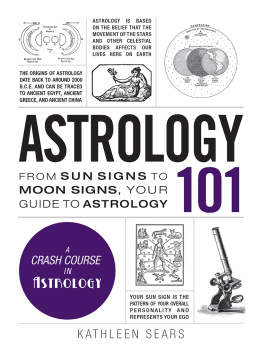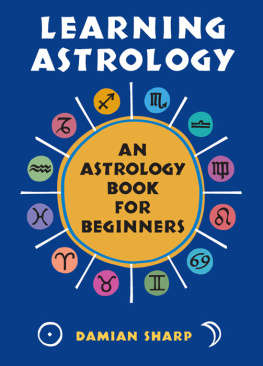THE ANNOTATED
RAPHAEL S
MUNDANE ASTROLOGY
OR
THE EFFECTS OF THE PLANETS AND
SIGNS UPON THE NATIONS AND
COUNTRIES OF THE WORLD
(1910)
BY ROBERT T. CROSS (1850 - 1923)
Revised, Edited and Annotated with Extensive Commentary
by ANTHONY LOUIS
(2013)
Based on a work in the public domain originally published in
LONDON:
W. FOULSHAM & CO.,
4, PILGRIM STREET, LUDGATE HILL, E.C.
Price One Shilling or 25 Cents.
1910 .
All Annotations, Revisions, Corrections and Editorial Comments are
Copyright Anthony Louis, 2013
All Rights Reserved
Kindle Edition 1.0
September 15, 2013
The o riginal 1910 text by Raphael is in the public domain. It was published 103 years ago and its author, Robert T. Cross, died 90 years ago in 1923. In the United States a work published anywhere in the world prior to 1923 is in the public domain. In the UK an authors copyright expires 70 years after his death. Raphaels copyright in the UK expired in 1993.
In this work I have revised and edited Raphaels original 1910 text, correcting errors and recalculating charts to improve their accuracy with a modern computer program.
<><><>
Astrological charts were cast using Solar Fire Gold and Janus 4 software.
The book cover contains a Chart Art image from Solar Fire Gold by artist Kay Steventon, used with permission.
All other images are in the public domain.
TABLE OF CONTENTS
INTRODUCTION by Anthony Louis
Mundane astrology (from the Latin mundus meaning world, universe, humankind) is the branch of the celestial science dealing with political and world events. Heads of nations have consulted mundane astrologers for thousands of years. This form of astrology, for example, was a key factor in Alexander the Greats defeat of the Persian Empires army at Gaugamela in 331 BC.
In more recent times the German astrologer Elsbeth Ebertin accurately predicted Hitlers political destiny in 1923, albeit from an allegedly incorrect horoscope cast for the Sun in the 29 th degree of Aries. Hitlers natal Sun, in fact, occupied the 1 st degree of Taurus when he was born on 20 April 1899. Ebertin must have erroneously consulted the ephemeris for 19 April 1899, the day before Hitlers birth. As often happens in astrological forecasting, Ebertins chart for Hitler worked quite well, even though it was not based on historically accurate information.
Elsbeth Ebertin died in Freiburg at the end of November 1944. Her son Reinhold later claimed that his mother had foreseen her own death but didnt want to relocate out of fear that her abrupt departure would panic her neighbors who believed she could tell the future. She chose to die in an air raid rather than upset her neighbors. What an altruistic lady she was!
Mundane astrology can be dangerous to practice. Throughout history, court astrologers have been executed for displeasing the ruler of the nation with their predictions, regardless of whether the forecast was accurate or not. In May of 1941 Reich Minister and amateur astrologer Rudolf Hess decided to fly to Scotland because he and his astrologers believed the stars foretold defeat for Germany. Hess wanted to negotiate a peace deal with the Allies. In response, Hitler became enraged and had the Gestapo round up hundreds of astrologers and occultists. Several stargazers were executed and the rest sent to concentration camps. The Fhrer blamed astrology for Hess betrayal of Hitlers megalomaniacal idea that the German master race should rule the world.
The book you are about to read looks at political astrology as it was practiced at the beginning of the 20 th century. Using Raphaels 1910 text on mundane astrology as a scaffold, I have revised and amply illustrated his original text with copious explanations, clarifications, case examples and modern charts. The Appendices contain a wealth of supplemental information that fleshes out Raphaels 80-page booklet, now in the public domain, and adds historical perspective to his approach.
During the last two centuries several authors have used the pen name Raphael to write books about astrology. They apparently chose the pseudonym because the Archangel Raphael is associated with Mercury a god of magic, divination, astrology and writing. At the time this text was originally published in 1910, astrologers in the UK wrote under pseudonyms to avoid being thrown in jail for practicing the celestial art.
To verify which of the many Raphaels wrote the 1910 version of the current text, I contacted David Roell of the Astrology Center of America. David kindly responded with an email in which he explained that Raphael was the pseudonym of a series of men, starting with the first and most famous, Robert Cross Smith (1795 - 1832). Cross Smith, the original user of the Raphael pseudonym, was succeeded by John Palmer (1807-1837), and then by some lesser known writers (Dixon, Medhurst, Wakeley, Sparkes) and finally by Robert T. Cross (1850 1923), the well-known author of the text you are about to read.
Robert T uck Cross (Aries ASC, Taurus Sun, Cancer Moon) is not to be confused with the original Raphael, Robert Cross Smith (Gemini ASC, Pisces Sun and Moon), or with any of the Raphaels in between. The author of Raphaels Mundane Astrology (1910), R obert T. Cross , inserted a symbol with the letter R centrally placed within a cross on the title page of his books.

Figure R obert T. Cross : "R" at the Center of a Cross

Figure 2 Birth Chart of Frederick Robert Tuck Cross aka "Raphael"
In an article at skyscript.co.uk, Kim Farnell tells us that this Raphael was born at Brockley Farm, Worstead (East Anglia), England on 15 May 1850 at 2:35 in the morning.
Robert Tuck Cross was a prolific writer with a knack for explaining complex astrological ideas in simple and direct language. He appears to have relied heavily on two 17 th century British texts for his information about mundane astrology: William Lillys Christian Astrology (1647) and William Rameseys Astrology Restored (1653). Parts of his 1910 text are copied verbatim from earlier sources without acknowledgement. Because Raphaels sources date back several centuries, some of his comments appear strange and antiquated to the modern reader, especially in his chapters on interpreting eclipses in the thirty-six decanates and assigning astrological rulers to various locations on earth. Nonetheless, the bulk of what Raphael presents in 1910 contains valuable information and is responsible to sparking and maintaining interest in mundane astrology for the past hundred years.
In editing and annotating Raphaels 1910 text, I have left the original text intact except for a few minor changes in spelling, formatting and punctuation. Errors and typos in the original have been corrected. Astrological data has been recalculated and rendered more accurate with the use of a modern computer. Any additions to the text appear in brackets. For example, my editorial comments, which are not part of the 1910 text, appear in brackets [ ] throughout this text.
I have added numerous astrological charts and case examples, not found in the original text, to illustrate Raphaels ideas and demonstrate how mundane astrology was practiced in the early 20 th century. My goal has been to present a version of Raphaels Mundane Astrology that is readily accessible to the modern reader. The material in the Appendices is not part of Raphaels original text. I have added extensive notes in the Appendices to flesh out Raphaels ideas with historical case examples.

